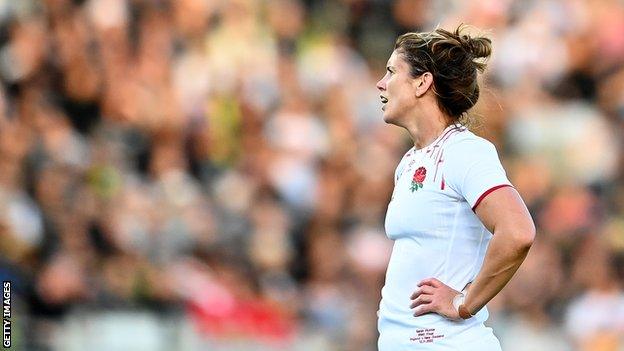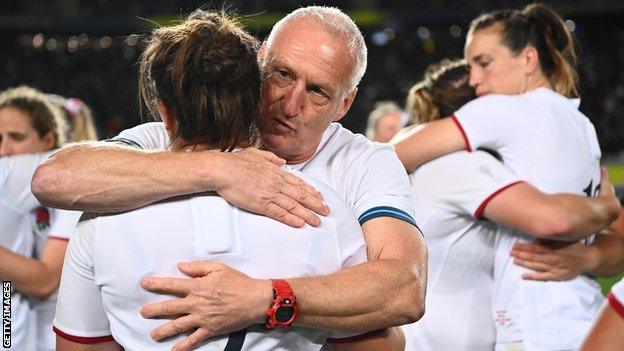England lost Rugby World Cup final, but women's game is now 'in another dimension'
- Published

Sarah Hunter said she hoped the final would "ignite" more nations to invest in the game
England captain Sarah Hunter swallowed back tears to discuss their heartbreaking World Cup final defeat by New Zealand, but the main feeling she conveyed afterwards was not sadness. It was pride.
Pride in leading a team that gave absolutely everything they had in search of greatness for 80 minutes.
And pride that, in pursuit of their goal, they were part of a game-changing night for women's rugby and women's sport as a whole.
England's footballers had their moment of glory this summer, and the Red Roses knew it was their chance next.
Unlike the Lionesses, they could not quite bring home the cup. But just like their footballing counterparts, they have very much proved a point.
The quality of the Rugby World Cup final cannot be ignored. There were 11 tries. It was a game that seemed to have been decided many times, before the record 42,579 crowd was shocked by yet another U-turn.
New Zealand beat England in dramatic World Cup final
New Zealand looked to have surely clinched victory as they took a three-point lead with nine minutes remaining.
But then England had a line-out, having scored 24 of their 38 previous tries from that weapon. The clock was in red, but there was time for one more.
This time, it did not work. It was New Zealand's Joanah Ngan-Woo who jumped highest and, just as they did in 2017 and in three other finals before that, the Black Ferns broke English hearts.
Despite another devastating defeat, the Red Roses already see they have been part of history.
"Let's use this to slingshot women's rugby into another dimension," said Abbie Ward, one of the leaders of the usually potent line-out.
Captain Hunter, who has earned more Test caps than any other male or female international with 140, was more reflective.
Regardless of how many World Cups she has won, Hunter is one of the most inspirational British sportswomen currently competing, and found time in her devastation to call for more support for the women's game.
England lead the way in professionalism, having had full-time contracts since 2019, while New Zealand only joined them earlier in 2022.
"You can't expect nations now not to go and invest in their teams when you have got a showcase of women's rugby in a final in front of 40,000 people," she said.
"Hopefully that will ignite other nations to go, 'We need to invest in our women's game and make it a fair playing field'."

As England head coach, Simon Middleton has lost the last two World Cup finals to New Zealand
It is not all pride and positivity, of course.
The darker side of rugby was on full show as three players went off with head injuries. Portia Woodman was first after a collision that caused England wing Lydia Thompson to get a red card in the 18th minute.
Woodman failed her head injury assessment and New Zealand director of rugby Wayne Smith said afterwards: "I don't know if she'd remember much of the game."
England lock Zoe Aldcroft was the next to go and not return, with wing Abby Dow following suit - although she came back after passing the assessment.
There may be questions, too, over why England's extra three years of professionalism did not get them over the line. The answer may be found in Smith's gameplan.
Such are Smith's smarts that he is known as 'the professor', having helped New Zealand's men to two World Cup titles, one of which was also on home soil.
The 65-year-old came out of retirement to help the Black Ferns after a damning cultural review led to a coaching shake-up, and he will return to the slow life now the job is done.
Smith admitted that New Zealand had been preparing for England for six months, and had developed their unstructured, chaotic style of play to combat the Red Roses' powerful forwards.
Eventually his plan worked and, in a career that has featured many highs, led to "the most phenomenal rugby moment" of his life.
Before this World Cup, no-one had ever paid to watch the Black Ferns in New Zealand.
When they lifted the trophy, over 40,000 were chanting their name.
"I never thought in 100 years you would be standing out in the middle of Eden Park and 40,000 people would be chanting 'Black Ferns'," Smith said.
"Something ignited this country around women's rugby and we've got to make it count. We have got to make it count with seven- or eight-year-olds who, when they go to high school, there is no team or no coach."
Like Hunter, Smith recognised the opportunity such a thrilling final offers, and called for New Zealand to capitalise.
"What worries me is if we don't surge ahead now, you've got highly professionalised French and English teams," he added. "You've got some of these other northern hemisphere teams. We've got to stay up with the pack."
England's professionalism may not have brought the result they wanted this time, but they will hope for better with their own packed stadium behind them when the 2025 World Cup final takes place at Twickenham.
Middleton would not be drawn on whether he will still be leading the side then. What he was happy to talk about: pride.
It may not be much consolation for England after losing their fifth World Cup final against New Zealand, but playing their part in the match is some achievement nevertheless.
"I could not be prouder of the players," Middleton said.
"I could not be more positive about that performance. Your World Cup has to take the game forward. If that doesn't take the game forward, there's something wrong. I'm pretty sure it will."

The legendary 'Tosh': A unique and nostalgic film celebrating the remarkable Welsh footballer
She scammed the world, then vanished: The 'Cryptoqueen' who persuaded millions to join her financial revolution
